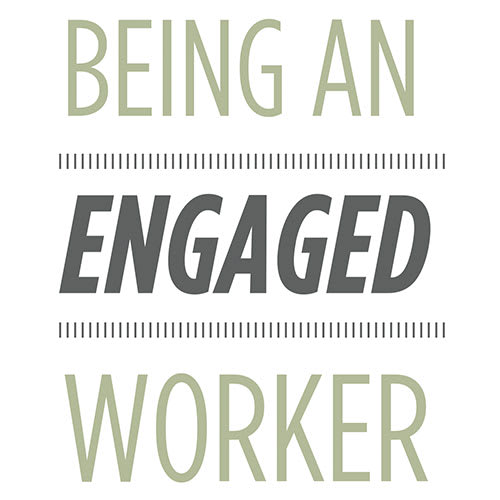Being an Engaged Worker

Written By: Robb Stevens
The troubling trend of quiet quitting has been in the news this year. To me, this raises several questions. Is this a new phenomenon? What causes an individual to quietly quit, thus working the system? How do employees justify this kind of unethical behavior? How can it be identified and then dealt with, and in the end, what does it really mean to put in an honest effort at work? Over a decade ago, I addressed this topic in Med One to One and with that last question in mind, I revisit the same topic here again.
How do you recognize a hard worker and an engaged employee? A definite answer to this question is tricky because expectations for different jobs vary widely based on assigned tasks for the specific job and the level of responsibility they have. It could also be debated whether a job requiring mental effort is more difficult than a job requiring physical effort. For example, which job is more difficult - the lumberjack or the person managing logistics of where the lumber will be delivered? There may be no right or wrong answer to that, but no one can debate the fact that both types of work are difficult in their own ways.
Whether it’s white collar or blue collar, both forms of labor are respectable for different reasons, but one can be more taxing than others. A physical labor job for most people means being on your feet for at least 8-10 hours per day. Not everyone is cut out for that type of physical demand, but then again, others cannot stand the thought of sitting at a desk for most of the workday either.
WHAT DOES IT REALLY MEAN TO PUT IN AN HONEST EFFORT AT WORK?
Regardless of the type of work your specific job entails, you will likely have an opinion on which is more difficult and hopefully an appreciation too for the effort required by others doing different jobs. You may believe that you do in fact work harder or that your assigned tasks have greater value than the next person. Perhaps your measurable results are far greater or more noticeable than some of your coworkers. Maybe you are demonstrably more passionate about your job and the company you work for than anyone else. Maybe you arrive at the office earlier than all others, or you’re there after they’ve all gone home. All these things are admirable and certainly good indicators that you are a hard worker, but every employee at a particular place of work has a different set of assigned tasks, objectives and responsibilities, so defining someone as a hard worker or even the hardest worker, really depends on the measuring stick being used. The measuring stick is different for every single job.
Fortunately, a division of labor creates an organized structure that allows each employee to excel at a specific function. In the end, the “assembly line” aspect of any company combines all the important functions into a unified purpose and hopefully, an excellent finished product or service. A well divided and well defined labor force utilizes workers in the area they are most effective or best trained in and generally ensures that those who are the most experienced and skilled managers are given management roles; those trained and proficient in accounting functions are specifically employed in handling accounting responsibilities; sales and marketing roles are filled by those that are best qualified to do sales and marketing; or production, or repair, or answering phones, or whatever the job may be. It would be utter chaos if a division of labor did not exist because everyone would be doing everything resulting in a “too many cooks in the kitchen” situation. This would very quickly bring productivity to a screeching halt!
With all the various functions that are handled within a business, the definition of “hard work” therefore depends on the functions and expectations that go with the specific job. If those functions are performed at a high level, then by definition, that worker is indeed “working hard.”
Roughly defined, work is simply effort or activity that is intended to accomplish a set of assigned tasks or produce a desired result. The effort or activities are ideally observable and/or measurable in some way, but hard workers can also be defined by intangible qualities as well. Intangible things like heart, passion, dedication, loyalty, and attitude may not necessarily be measurable, but they are noticeable and they absolutely matter!
A hard worker doesn’t have to be married to their job at the expense of other important life priorities, but they should have a reasonable level of personal investment in the success and well-being of the company they work for.
For a business owner, there is built-in vested interest from day one, and they will inherently pour their heart and soul into making it successful. Because of that, business owners may rightly be viewed as its hardest workers. Especially in the early going, they wear many hats and the division of labor enjoyed later is shared by only a few individuals. They have the most to gain if it succeeds and certainly the most to lose if it fails.
An engaged employee does more than just meeting the basic requirements of a job. Hard workers magnify their responsibilities by discovering ways to innovate and lead others to do the same within the scope of their responsibilities. By tapping into the intangible qualities noted earlier, ultimately the measurable results will be impacted in powerful and transformative ways.
HARD WORKERS MAGNIFY THEIR RESPONSIBILITIES BY DISCOVERING WAYS TO INNOVATE AND LEAD OTHERS...
On a business trip years ago, I stopped at an airport Jamba Juice shop to buy a smoothie on my way home. The cashier who helped me that day demonstrated perfectly what an engaged employee looks like. Anyone can stand there and take your money, then say “next” to the person waiting behind you, but this guy was friendly, warm and sincere. Technically, his job description as cashier is very simply to take a quick order, ring up each customer, tell them what they owe, take their money and move on. In our brief interaction, he gave me a few valuable insights on the menu items I was considering, complimented me on what I eventually chose, then looked me in the eye and told me with a smile to have a great day and thanked me for my business. The tip I gave on that occasion was definitely earned! As an engaged employee, this Jamba Juice worker not only elevated himself, he elevated his company as well by the way he interacted with customers.
Every person no matter how seemingly insignificant or grand their job is, can take a similar approach. For any job there are endless ways to engage and innovate. When you are fully engaged, measurable results will always be magnified by what drives you inside.

